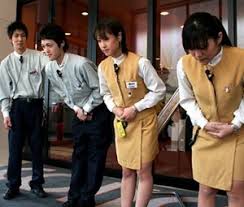Thursday, April 29, 2010
The Use Of "san" in Japanese
The Japanese use -san when calling other people, the meaning is close to “Mister” “mistress” or “Miss”. The placement of san are at the end of the name and can be used both of which the last name and first name. Using the word san would sound polite than just a name. There are several forms of -san more politely and more used to like:
Kun : not used in formal situations,kun used on young men who had known each other
chan : commonly used among child to child, or adult to child
sensei : used when calling on teachers or lecturers
Important thing to know is do not use the word san when talking about yourself you or your family members.
Example:
"Kanzaki-san desu ka"
in English
"Are You Mr. Kanzaki? "
" Hajimemashite. Ryuki Raida desu "
in English
" How do are you? My name is Rider Ryuki "
Bowing Culture in Japan


Bowing is one of the cultures of people - the Japanese. They bowed when met;
waiter bowed when you enter the store or an elevator, students - high school students bent over at the beginning and end of lessons, and even you will see the Japanese people bow when calling.
How to bend it shows the status of people you meet, a slightly stooped committed against their peers, which bent in against someone who is important. A man bent over with both hands on the side and bent over with her hands crossed in front just above the knee.
Monday, April 19, 2010
HAJIMEMASHITE...!
Hajimemashite..!
In english is How are you...! let's learn some greeting in Japanese. Below are some vocabularies (tango-hyo) which are used in greeting:
If you watch anime in raw format, you should familiar with those words. Or you wach this video.
next lesson
In english is How are you...! let's learn some greeting in Japanese. Below are some vocabularies (tango-hyo) which are used in greeting:
- Ohayo gozaimas(u) : good morning
- Konnichwa : hello, good afternoon
- Konbanwa : good day
- Oysumi : nasai good night
- Sayonara :good bye(formal)
- Bai bai : good bye
- Ja mata ne! : See you...!
- introduce
- Mata ash(i)te : how do you do
- Dozo yoush(i)ku : please to meet you, nice to meet you
- Kochira wa ryuki : this is ryuki
- Domo arigato(gozaimas(u)) : thank you very much
- Arigato : thank you
- Sumimasen : sorry
- Hai : yes
- Iie : no
- Desu : similar with “to be” in English such as "is, am, are"
If you watch anime in raw format, you should familiar with those words. Or you wach this video.
next lesson
Sunday, April 18, 2010
Welcome...!
Hello, this my first blog at blogspot.
I want to introduce my self, here is my soudtrack:
let's sing together.
Alive a life by Rika Matsumoto
[00:33.03]Asayake ni tsutsumarete hashiridashita
[00:37.78]Yuku beki michi wo
[00:39.59]Jounetsu no Bekutoru ga
[00:42.43]Boku no mune no tsuranuiteiku
[00:45.98]
[00:46.43]Donna kiken ni kizutsuku koto ga attemo
[00:52.70]
[00:53.26]Yume yo odore kono hoshi no moto de
[00:59.03]Nikushimi wo utsushidasu
[01:02.83]Kagami nante kowasu hodo
[01:06.90]Yume ni mukae mada bukiyou demo
[01:12.66]Ikiteiru hageshi sa wo
[01:16.47]Karada juu de tashikametai
[01:24.00]
[01:31.07]Taiyo ga toozakaru yami no naka de mayou tokidemo
[01:37.59]Me wo tojite mune ni aru
[01:40.39]Koe wo kikeba susunde yukeru
[01:44.00]
[01:44.41]Dare yori tsuyoku inochi no oto o narashite
[01:50.86]
[01:51.25]Ai yo terase kono sora no hate mo
[01:57.00]Shinjitsu wo madowaseru
[02:00.85]Kagami nante warebaii
[02:04.89]Ai wo daite ima kimi no tame ni
[02:10.64]Shinkasuru tamashii ga
[02:14.50]Negatteita mirai wo yobu
[02:19.56]
[02:19.73]Jama wa saserai
[02:22.84]Yowaki na sakebi furikaeru na
[02:28.96]Michi wa haruka tsutzuiteku
[02:35.64]
[02:46.33]Kokoro wo atsuku kibou no iro ni moyasou
[02:52.50]
[03:15.17]Yume yo odore kono hoshi no moto de
[03:20.62]Nikushimi wo utsushidasu
[03:24.45]Kagami nante kowasu hodo
[03:28.55]Ai yo terase kono sora no hate mo
[03:34.27]Shinjitsu wo madowaseru
[03:38.10]Kagami nante warebaii
[03:42.19]Ai wo daite ima kimi no tame ni
[03:47.97]Shinkasuru tamashii ga
[03:51.80]Negatteita mirai wo yobu
I want to introduce my self, here is my soudtrack:
let's sing together.
Alive a life by Rika Matsumoto
[00:33.03]Asayake ni tsutsumarete hashiridashita
[00:37.78]Yuku beki michi wo
[00:39.59]Jounetsu no Bekutoru ga
[00:42.43]Boku no mune no tsuranuiteiku
[00:45.98]
[00:46.43]Donna kiken ni kizutsuku koto ga attemo
[00:52.70]
[00:53.26]Yume yo odore kono hoshi no moto de
[00:59.03]Nikushimi wo utsushidasu
[01:02.83]Kagami nante kowasu hodo
[01:06.90]Yume ni mukae mada bukiyou demo
[01:12.66]Ikiteiru hageshi sa wo
[01:16.47]Karada juu de tashikametai
[01:24.00]
[01:31.07]Taiyo ga toozakaru yami no naka de mayou tokidemo
[01:37.59]Me wo tojite mune ni aru
[01:40.39]Koe wo kikeba susunde yukeru
[01:44.00]
[01:44.41]Dare yori tsuyoku inochi no oto o narashite
[01:50.86]
[01:51.25]Ai yo terase kono sora no hate mo
[01:57.00]Shinjitsu wo madowaseru
[02:00.85]Kagami nante warebaii
[02:04.89]Ai wo daite ima kimi no tame ni
[02:10.64]Shinkasuru tamashii ga
[02:14.50]Negatteita mirai wo yobu
[02:19.56]
[02:19.73]Jama wa saserai
[02:22.84]Yowaki na sakebi furikaeru na
[02:28.96]Michi wa haruka tsutzuiteku
[02:35.64]
[02:46.33]Kokoro wo atsuku kibou no iro ni moyasou
[02:52.50]
[03:15.17]Yume yo odore kono hoshi no moto de
[03:20.62]Nikushimi wo utsushidasu
[03:24.45]Kagami nante kowasu hodo
[03:28.55]Ai yo terase kono sora no hate mo
[03:34.27]Shinjitsu wo madowaseru
[03:38.10]Kagami nante warebaii
[03:42.19]Ai wo daite ima kimi no tame ni
[03:47.97]Shinkasuru tamashii ga
[03:51.80]Negatteita mirai wo yobu
Subscribe to:
Posts (Atom)